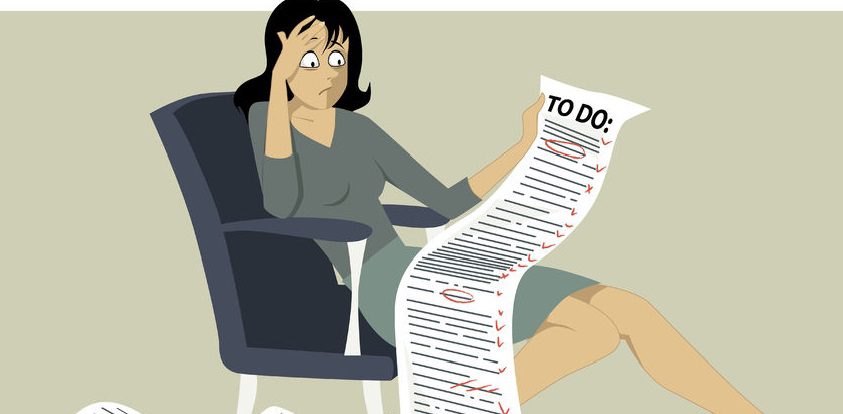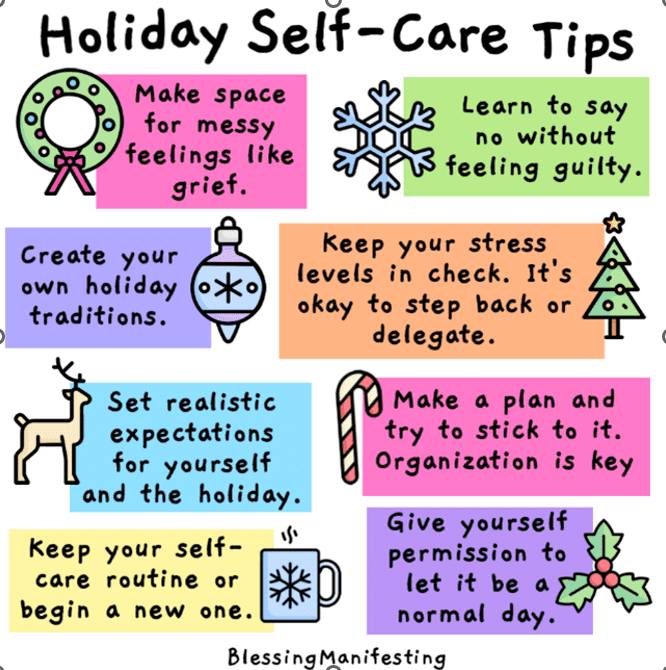Managing Your Mental Health During the Holiday Season
By: Krista Mueller, LPC, NCC
12/11/2023

As much hype as there is around the holidays, not everyone is able to enjoy them so easily. Holidays can stress the importance of cheerfulness, love, joy, peace, and happiness, and yet the holidays can bring the exact opposite for some. As sparkling and exciting as the holiday season can be, it can also bring a great deal of stress and triggers.
The holiday season can have quite an impact on our mental health, positive and negative. Even if it is a season you love, the number of activities and tasks that you may have to do can be overwhelming.
You might have children or multiple families to buy for, multiple events to attend, numerous desserts or food to prepare, numerous people to see, decorations to put up, end of the year work tasks, etc. There is a reason they call this the “busiest season of the year.”
Triggers. The holidays can be full of them. From family and friends to a packed schedule, anything in between can be a trigger to send one’s mental health in a spiral. It may be family conflicts, seeing certain people you do not mesh well with, the cold, dark season, your routine changing, your schedule not being consistent, traveling, etc. None of these are exactly simple and yet they are happening.
Strategies for Maintaining Your Well-Being
Self-care:
Think of some ways you can recharge. This may be finding sunlight, music, a warm bath, deep breathing, grabbing your favorite blanket, reading a book, etc. Don’t forget to take care of your body too with a balanced diet and enough solid sleep (Bommersbach, 2023).
Exercise:
Activity can be limited in the winter months. Get your body moving. This could be at the gym, a home exercise, dancing, or something else!
Meditation:
Find a guided meditation online or create your own. Be mindful of your body. Notice any feelings that may come up as you pause to take a few deep breaths. Explore some breathing exercises or listen to an ASMR video.
Journal:
Journaling does not always have to be writing out your feelings. It could be pretending to talk to or write a letter to someone that may no longer be with you anymore or to cleanse thoughts on your mind you may not actually be able to say to them. Write affirmations about yourself. Vent. Write however you want, just release your mind from all it is holding on to. Even use a journal to track your mood and thoughts.
Engage in the Community:
Holidays bring many volunteer opportunities, whether that may be at an event, an animal shelter, a food pantry, or something else. Seek out support groups. Attend local gatherings at your church or a public event. Schedule calls or video chats with friends and family often, if you are not able to see them in person (Bommersbach, 2023).


If you do find yourself in a crisis, here are some things you can do:
- Text or call 988 – Suicide and crisis lifeline.
- HOME 741741 – Crisis text line connecting you with a crisis counselor.
- Dial 211 or call 888-865-9903 – An individual will assess your needs and provide referrals to community resources, including finding help for financial issues, substance abuse, and suicide prevention. They also can assist in finding donation/volunteer opportunities.
- Call 1-800-662-HELP (4357) SAMHSA’s National Helpline – A 24-hour free information service providing referrals to local treatment centers, support groups, and community organizations. Offers English and Spanish.
If it is not an emergency but you still need support, contact your counselor, or make an appointment with one.
We are here to help you!
Call our admin team at 847-854-4333 or email them at admin@owenscounseling.com to schedule an appointment with one of us.
Reference:
Bommersbach, Tanner. “Supporting Your Mental Health during the Holiday Season.” SAMHSA, 27 Nov. 2023, www.samhsa.gov/blog/supporting-
your-mental-health-during-holiday-season.
